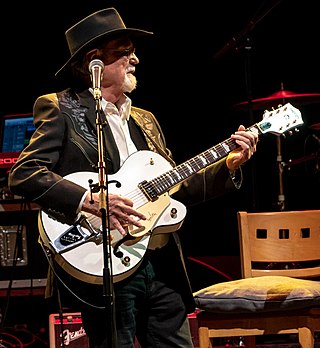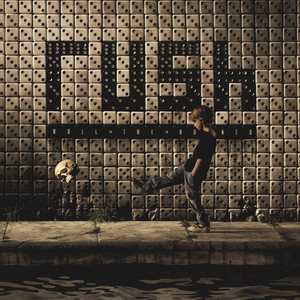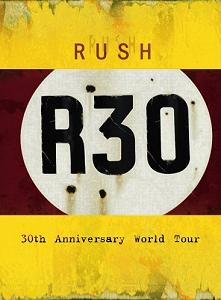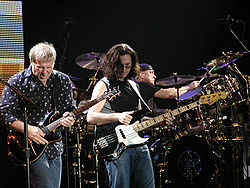
Aleksandar Živojinović, known professionally as Alex Lifeson, is a Canadian musician, best known as the guitarist for the rock band Rush. In 1968, Lifeson co-founded a band that would later become Rush, with drummer John Rutsey and bassist and lead vocalist Jeff Jones. Jones was replaced by Geddy Lee a month later, and Rutsey was replaced by Neil Peart in 1974, after which the lineup remained unchanged until the band's dissolution in 2018. Lifeson was the only member of Rush who stayed in the band throughout its entire existence, and he and Lee were the only members to appear on all of the band's albums.

Geddy Lee Weinrib is a Canadian musician, best known as the lead vocalist, bassist, and keyboardist for the rock group Rush. Lee joined the band in September 1968, at the request of his childhood friend Alex Lifeson, replacing original bassist and frontman Jeff Jones. Lee's solo effort, My Favourite Headache, was released in 2000.

Neil Ellwood Peart OC was a Canadian musician, best known as the drummer and primary lyricist of the rock band Rush. Peart earned numerous awards for his musical performances, including an induction into the Modern Drummer Readers Poll Hall of Fame in 1983 at the age of thirty, making him the youngest person ever so honoured. He was known to fans by the nickname 'The Professor', derived from the Gilligan's Island character of the same name. His drumming was renowned for its technical proficiency and his live performances for their exacting nature and stamina.

Rush was a Canadian rock band that primarily comprised Geddy Lee, Alex Lifeson (guitar) and Neil Peart. The band formed in Toronto in 1968 with Lifeson, drummer John Rutsey, and bass guitarist/vocalist Jeff Jones, whom Lee immediately replaced. After Lee joined, the band went through several line-up changes before arriving at its classic power trio lineup with the addition of Peart in July 1974, who replaced Rutsey four months after the release of their self-titled debut album; this lineup remained intact for the remainder of the band's career.

Duane Eddy is an American rock and roll guitarist. In the late 1950s and early 1960s, he had a string of hit records produced by Lee Hazlewood, which were noted for their characteristically "twangy" sound, including "Rebel-'Rouser", "Peter Gunn", and "Because They're Young". He had sold 12 million records by 1963.

Roll the Bones is the fourteenth studio album by Canadian rock band Rush, released September 3, 1991, on Anthem Records. The band began working on the album after a brief creative hiatus following the tour promoting their previous release, Presto (1989).

The Ventures are an American instrumental rock band formed in Tacoma, Washington, in 1958, by Don Wilson and Bob Bogle. The band, which was a quartet for most of its existence, helped to popularize the electric guitar across the world during the 1960s. While their popularity in the United States waned in the 1970s, the group remains especially revered in Japan, where they have toured regularly. The classic lineup of the band consisted of Wilson, Bogle, Nokie Edwards, and Mel Taylor (drums).

Rush in Rio is a three-disc live album by Canadian band Rush, released on October 21, 2003. The album is also available as a two DVD set. With the exception of the last two tracks on the third disc, the album was recorded at Maracanã Stadium in Rio de Janeiro on the final night of the Vapor Trails Tour. The other two tracks were taken from previous shows on the same tour. "Between Sun & Moon" was recorded at the Cricket Wireless Pavilion, Phoenix, Arizona, on September 27, 2002, and "Vital Signs" was recorded at the Colisée Pepsi, Quebec City, Quebec, on October 19, 2002.

Verdine Adams White is an American musician, best known as a founding member and bassist for the band Earth, Wind & Fire. White was placed at No. 19 on Rolling Stone's list of The 50 Greatest Bassists of All Time.

"Tom Sawyer" is a song by Canadian rock band Rush, originally released on their 1981 album Moving Pictures as its opener. The band's lead singer, bassist, and keyboardist, Geddy Lee, has referred to the track as the band's "defining piece ... from the early '80s". It is one of Rush's best-known songs and a staple of both classic rock radio and Rush's live performances, having been played on every concert tour since its release.

"Closer to the Heart" is a song by Canadian rock band Rush. It was released in November 1977 as the lead single from their fifth studio album A Farewell to Kings. It was the first Rush song to feature a non-member as a songwriter in Peter Talbot, a friend of drummer and lyricist Neil Peart. It was Rush's first hit single in the United Kingdom, reaching number 36 in the UK Singles Chart in February 1978. It also peaked at number 45 in Canada and number 76 on the US Billboard Hot 100. It was inducted into the Canadian Songwriters Hall of Fame on March 28, 2010.

R30: 30th Anniversary World Tour is a live DVD by the Canadian rock band Rush, released on November 22, 2005 in Canada and the US, and November 28, 2005 in Europe. The DVD documents the band's R30: 30th Anniversary Tour, and was recorded on September 24, 2004 at the Festhalle Frankfurt, Germany.

"Subdivisions" is a song by Canadian progressive rock group, Rush, released as the second single from their 1982 album Signals.
"Working Man" is a song by Canadian rock band Rush from their self-titled debut album. In an interview on the Rolling Stone YouTube channel, bassist and lead vocalist Geddy Lee said that "Working Man" is his favorite song to play live. "Working Man" became a favourite among Rush fans; the guitar solo appeared on Guitar World magazine's 100 Greatest Guitar Solos list.

Snakes & Arrows is the eighteenth studio album by Canadian rock band Rush, released on May 1, 2007, by Anthem Records. After their R30: 30th Anniversary Tour ended in October 2004 the band took a one-year break, during which they agreed to start work on a follow-up in January 2006. The album was recorded in five weeks with co-producer Nick Raskulinecz, a fan of the group who was praised by each member for his approach and technique. It contains three instrumental tracks, the most on any Rush album.
Malignant Narcissism is an instrumental track from Rush's 2007 album Snakes & Arrows. "Malignant Narcissism" was nominated for a 2008 Grammy under the category of Best Rock Instrumental Performance, Rush's fifth nomination in said category. However, the song lost to Bruce Springsteen's "Once Upon a Time in the West" making it their fifth defeat in that category.

Snakes & Arrows Live is a live double CD and DVD by Canadian band Rush. The CD was released on April 14, 2008, in the UK and on April 15, 2008, around the world. It was also released on DVD and Blu-ray on November 24, 2008. The material was taken from two performances during the first leg of the Snakes & Arrows Tour, recorded at the Ahoy Arena in Rotterdam, Netherlands on October 16 and 17, 2007. The album features nine of its 27 tracks drawn from Snakes & Arrows.
"YYZ" is an instrumental rock composition by the Canadian rock band Rush from their 1981 album Moving Pictures. It is one of the band's most popular pieces and was a staple of the band's live performances. The live album Exit... Stage Left (1981) and the concert video recording A Show of Hands (1989) both include versions in which Neil Peart incorporates a drum solo – as an interlude on the former, and as a segue out of the piece on the latter.
















